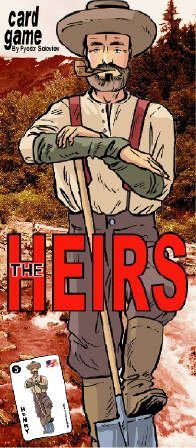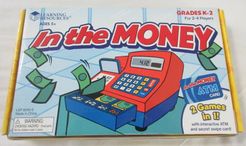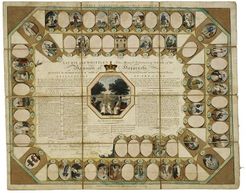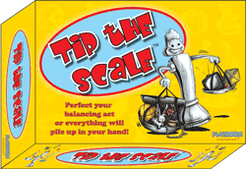|
Advertisement
|
The Heirs

DescriptionTHE HEIRS CARD GAME GAME CATEGORY: Outplay Game. GROUP OF GAMES: Matching Games. THE AIM OF THE PLAYERS: To make other player unable to move a card. SIMILAR GAMES: Meet the Ancestors, Chess, Checkers, or Draughts. AMOUNT OF PLAYERS: 2 (or two couples.) TIME TO PLAY: 10-30 minutes. CARDS: 32 cards from Six Generations deck. Only cards with numbers 1, 2, 3, 4 & 5 are used. SHUFFLING: Yes. DEALER: There is no dealer. SCENARIO: The Multimillion Dollar Inheritance, Left in 1917 By Californian Gold Miner to His Future Smartest Great-Great-Grandchild, Still Waits for the Winner. Four generations of Henry Smith's siblings have been waiting for 90 years, for only two of the qualified heirs, Emily and Jacob, brother and sister, to turn sixteen by 2006 and enter into genealogy battle with their numerous ancestors and trustees about what being the "smartest" heir means. Instead, he signed his inheritance to some unknown great-great-grandchild, to be born in the future, and he died shortly afterward. That made his son change his mind, marry soon, have a son named James, and manage the destiny of his other siblings, so they would keep the family dynasty alive for another three generations in order to get the inheritance. The family line almost stopped when James's only son David was killed in Vietnam in 1964. His father was forced to remarry, and at the age of 47 he and his new wife Linda had another son, Michael. Michael, now 40, and his wife Jennifer, have two children, Emily, 17, and Jacob, 16, who are the straight heirs of their great-great-grandfather Henry. The judicial problem with selecting the right heir for billion-dollar assets is that even though the children have agreed to share the money equally, they still must compete with each other, because legally the inheritance should be given to only one: the smartest child. Rules of competition between Emily and Jacob have been set by the board of trustees, who might hold the funds until the contest is over. Emily and Jacob must square off to find the "smartest heir" - by winning the chess-style card game called "The Heirs". DESCRIPTION: The pack of genealogical playing cards called "Six Generations" will be used to play "The Heirs". Instead of using the entire 72 card deck, "The Heirs" will be played with only 32 cards numbered 1 to 5. The playing field consists of 32 squares having 4 rows and 8 columns on it. The total playable size of the field is 15” x 20” (38 x 50 cm.) Two players, one of them helping Emily and the other helping Jacob, must open cards placed at random with all their ancestors in four generations and have them join in the thrilling fight for the inheritance. All cards with black numbers (men) will help Jacob, and the red cards (women) will help Emily to win. The number on each card represents a generation of relatives in the family.2 cards from generation #1 are Emily and Jacob, brother and sister, by themselves. Generation #2 with also two cards is their parents, Jennifer and Michael. Generation #3 - 4 cards – represents the children’s grandparents - Mary, Linda, James and Robert. 8 cards from generation #4 are their great grandparents - Margaret, Helen, Mildred, Dorothy, George, William, Joseph and John. And 16 cards from generation #5 are their 16 great-great grandparents including Henry Smith. Their names are Florence, Minnie, Elizabeth, Lillian, Emma, Marie, Alice, Martha, Henry, Harry, Harold, Edward, Walter, Arthur, Frank and Albert. UNDERSTANDING THE GAME: According to the story, a family member of the younger generation makes a genealogical search. They then meet in person or find the record of a relative from the same or older generation. To get the inheritance, Emily and Jacob must prove their relation to Henry Smith, their great-great grandfather. They need to provide a list of all their 30 ancestors in four older generations as well as prove to trustees that they are the only two surviving heirs among his great-great grandchildren. BEFORE STARTING THE GAME, TWO PLAYERS MUST DO THE FOLLOWING: 1. Decide who will get black cards (men) and who will get red cards (women); 2. Decide who will start the game first; 3. Withdraw 40 cards with numbers "6" from the original Six Generations deck, because they are unusable in "The Heirs" card game; 4. One player must shuffle the remaining 32 cards (with numbers 1, 2, 3, 4, 5) and place them in random order face down on the board or the desk in four rows and eight columns. No one should see the face of the cards. TIP: During the game try be accurate always keeping the rows and columns with the cards straight. RULES: 1. The player can make only one move at a time during the turn. NOTES: A. If both players are unable to make a move simultaneously, then the player whose turn it is at that time loses the game! B. If it is your turn to play but you do not have any card of your color on the board - you lose! EACH PLAYER CAN MOVE A CARD IN THREE DIFFERENT WAYS: 1. The player can simply turn over any card face up. Since there are 32 cards in the game, each player can make at least 16 moves by turning a card face up. 2. If two cards of the opposite colors (black and red) have already been opened in the previous moves, and they have common border from top, bottom, left or right of each other, then the player whose card has a lower or the same number can replace the card of the opposite color by moving their own card to the other card’s square. The replaced card has to be discarded from the game and set aside face down. NOTES: A. The same move can be done even if there are several empty squares between the two cards. B. The cards should not replace each other if they are attached only by the corners. C. Card #1 can replace any card of the opposite color. Card #2 can replace cards from #2 to #5 of the opposite color. Card #3 can replace cards from #3 to #5 of the opposite color. Card #4 can replace cards #4 and #5 of the opposite color. Card #5 can replace only card #5 of the opposite color. D. A player whose cards are red can replace only black cards with red cards. A player who is playing with black cards can replace only a red card with a black card. E. During this move the player does not need to open any new card. F. If there are one or more combinations on the board when one card may replace another card, the player can either choose any combination or can ignore them all and instead open a new card. G. The players should not review the discarded cards after the move is done. H. If all the cards have been opened already, replacing the correct bordering card becomes the only option for the player. 3. The player can make a move as a combination of moves #1 and #2. If the player has opened a new card which borders with a card of the opposite color from the top, bottom, left or right, (which has already been opened), and if one of those cards, which belongs to the player, can replace the other card, then the player can immediately replace another card in the same move. NOTES: A. This move can be done only between a few cards, one of which is a newly opened card. B. If the player decided to open a new card, but there were possibilities of replacing one or more cards on the board before the new card has been opened, those opportunities would be lost and may not be executed during the same move. GAME STRATEGIES: - The most important is to save moves for yourself for the end of the game, and to take this opportunity away from the other player.- Save and protect the cards with the more powerful, lower numbers (like “1” or “2”) because they will help you to make more moves at the end. - Try to block other players’ best cards inside the cards with the same color so they will not be movable. - Leave the other players’ best cards alone on one row or a column, not letting them make any moves. - As soon as you start memorizing the cards which have been replaced and discarded, and start predicting all the possible moves of the other player and yourself, (usually at the end of the game) you will be at the right place to win. Your memory is your helper. GOOD LUCK! And don't mess with the cards, neither cheat or misplace them. The trustee is watching you... You have only one chance to play the game and win if you want to become Henry Smith’s heir! The rules and the board to play "The Heirs" are available for copying and printing at www.sixgenerations.com. ISBN: 0976041804 Game DiscussionsAdd CommentYou need to be logged in to comment. Insert Bullet List Please enter at least one item. Item: Item: Item: Item: Item: Insert Numeric List Please enter at least one item. Item: Item: Item: Item: Item: Insert Link Please enter the link of the website Optionally you can add display text Insert Email Please enter the email address Optionally add any display text Insert Image Please enter the link of the image Insert YouTube Video Please enter the link of the video MarketplaceNo listings at the moment. Do you own this game? Click here to list it for sale.
|
Best Sellers
Board Games
|
||||
Latest Searches: war and pieces | disney boared game | el internado laguna negra | the+inspector | hostage negotiator | family feud australia | Anna Maria islan monopoly | nerf wolf lr-1 | Monopoly Burke Va edition | Detroit Lakes, Minnesota | moch | Hooks do | oven | spanish version taboo | Osmo | Woodstock-opoly | Balance of Power | Claytonopoly | the civil war | alamo | feed the elephant | pathfinder wrath of the righteous | kingdom hearts monooly | All American Trivia Board Game | Prove it | Ocala Florida hometown monopoly | Lake | Blow | aye dark overloard | Geographic
All Rights Reserved











Comments (0)